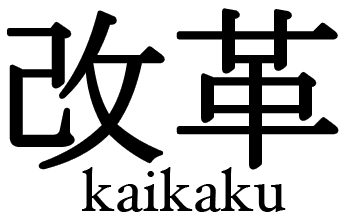Kaikaku Source QCFI Vizag Chapter
Kaikaku (Japanese word for “radical change”) is a business concept
concerned with making fundamental and radical changes to a production
system. Kaizen on the other hand is focused on incremental or continuous
minor changes of a certain area of a production system, often with the
primary goal of solving team related problems.
Both Kaizen and Kaikaku can also be applied to activities other than
production. Both these concepts have origins in the Toyota Production
System. Kaikaku means a radical change, during a limited time, of a
production system. Kaizen, on the other hand, is based on employees‟
involvement and individual activities generally reach an improvement of less
than 20%. A crossover between Kaikaku and Kaizen is Kaizen Blitz (or
Kaizen Events), which implies a radical improvement in a limited area, such
as a production cell, during an “intense week”.
Kaikaku means that an entire business is changed radically, normally always
in the form of a Project. Kaikaku is most often initiated by management,
since the change as such and the result will significantly impact business.
Kaikaku is about introducing new knowledge, new strategies, new
approaches, new production techniques or new equipment. Kaikaku can be
initiated by external factors, e.g. new technology or market conditions.
Kaikaku can also be initiated when management see that ongoing
Kaizen work is beginning to stagnate and no longer provides adequate
results in relation to the effort. Kaikaku projects often result in
improvements in the range of 30-50% and a new base level for
continued Kaizen. Kaikaku may also be called System Kaizen.
Kaikaku projects can be of four different types:
Locally Innovative – Capital intensive
E.g. An installation of robot automation in a factory is not new
to the industry in general, but may be new to the company. The
decision is strategically grounded and could mean higher costs.
Locally Innovative – Operation
E.g. The introduction of conventional methods Six
Sigma or TPM may be new to the company. The direct cost is
relatively small.
Radically Innovative – Capital intensive
E.g. The introduction of a new and innovative production
technology.
Radically Innovative – Operation
E.g. The introduction of new and innovative production
solutions that are new to the industry.
Posted by: A K Kameswara Sarma
RINL, Vizag Steel











Comments are closed.